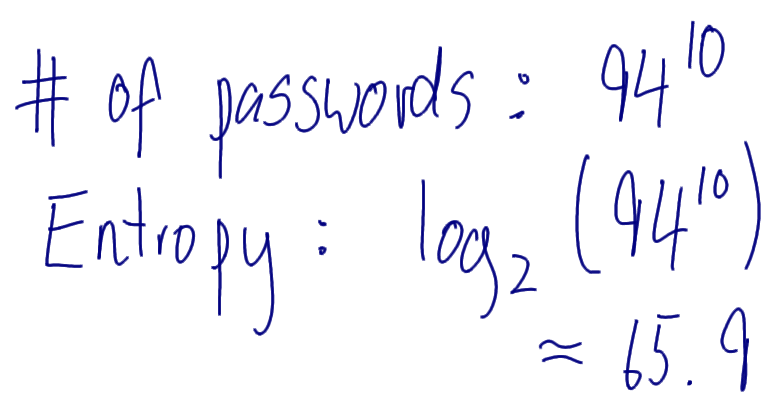

This might be true for the German language while the English language might have about 500,000 words ( reference1 reference2). For the generation of the passphrase I assume that the language has about 200,000 words.
#Password entropy password#
I used a character set for the password of 83 different characters (a-z, A-Z, 0-9, as well as the following symbols: If a calculator has only the or functions, the following algorithm can be used. (The bits of entropy are calculated with. That is, we would have 47458321 different possibilities for the password resulting in 26 bits of entropy. For example, when using 83 different characters for a password with only 4 chars, the calculation would be. To calculate the entropy of a password, the character set is raised to the power of the password length. This is basically the entropy of the password since it is chosen completely random. Well, it’s only a bit of math to calculate the strength of a password. (In any case: I assume that the attacker actually has the possibility to test the brute-force generated passwords against the real password, e.g., in comparing the hash-values as he might know the hash from the real password, or the like.) The Math Behind That is: Every combination of words is tested against the passphrase. For cracking the passphrase, a brute-force attack in conjunction with a dictionary attack is used. That is: A machine must try every single possible combination of characters in the case of the password.
#Password entropy generator#
(E.g., use the password generator in KeePass to generate random passwords, explained here.) The only chance to break these passwords is via brute-force. Note that when entering common passwords or passwords with sequential digits or letters or passwords with common words, the entropy will be lower than that calculated with the formula above.I assume that each character (or word) of the password is chosen completely random! That is: The passwords/passphrases used in this scenario are generated from a truly random source and not from a human. If the password entropy of a twelve character password is 55.7 bits,Ĭlick here for a Password Strength Test Checker If the password entropy of an eight character password is 34.9 bits, R = 82 since it uses upper and lower case and ASCII characters R = 26 since its pool of characters is just the 26 lower case letters and L = 8 (the length)

That approaches the "exponential wall," where a passwordġ - 10 Now calculate password entropy for the following passwords: In info-security lingo, it's 78.9 bits of entropy.

That's the same as 2 78.9 - and the log 2 of that is 78.9. If you have a 12-character password, then L = 12. If your keyboard has 95 unique characters and you are randomly constructing a password from that whole set, then R = 95. While a password with 40-50 bits of entropy may be semi-safe now, it is only a matter of time until GPUs become more powerful, and password cracking takes less time! < 28 bits = Very Weak might keep out family membersĢ8 - 35 bits = Weak should keep out most people, often good for desktop login passwordsģ6 - 59 bits = Reasonable fairly secure passwords for network and company passwordsĦ0 - 127 bits = Strong can be good for guarding financial information Password strength is determined with this chart: I made a table below to outline the rest. We calculate password entropy by first looking at the pool of characters a password is made from.įor example, the password password would have a possible pool of 26 characters from the English alphabet.Ĭhanging the password to Password would increase your pool to 52 characters. Entropy is good: the bigger the E, the harder a password is to crack. Password entropy is a measurement of how unpredictable a password is.Į stands for "entropy," which is the opposite of an ordered pattern.


 0 kommentar(er)
0 kommentar(er)
